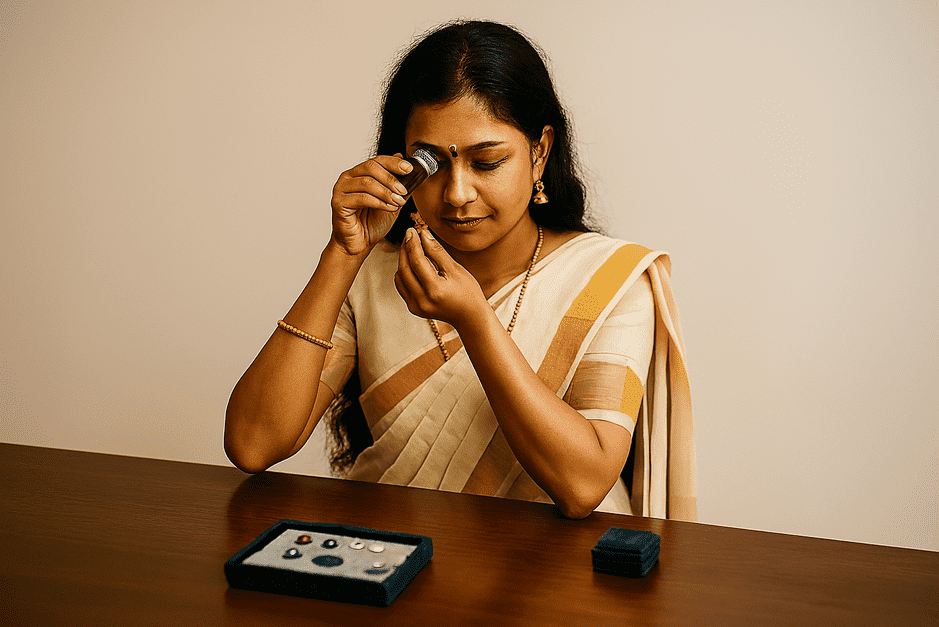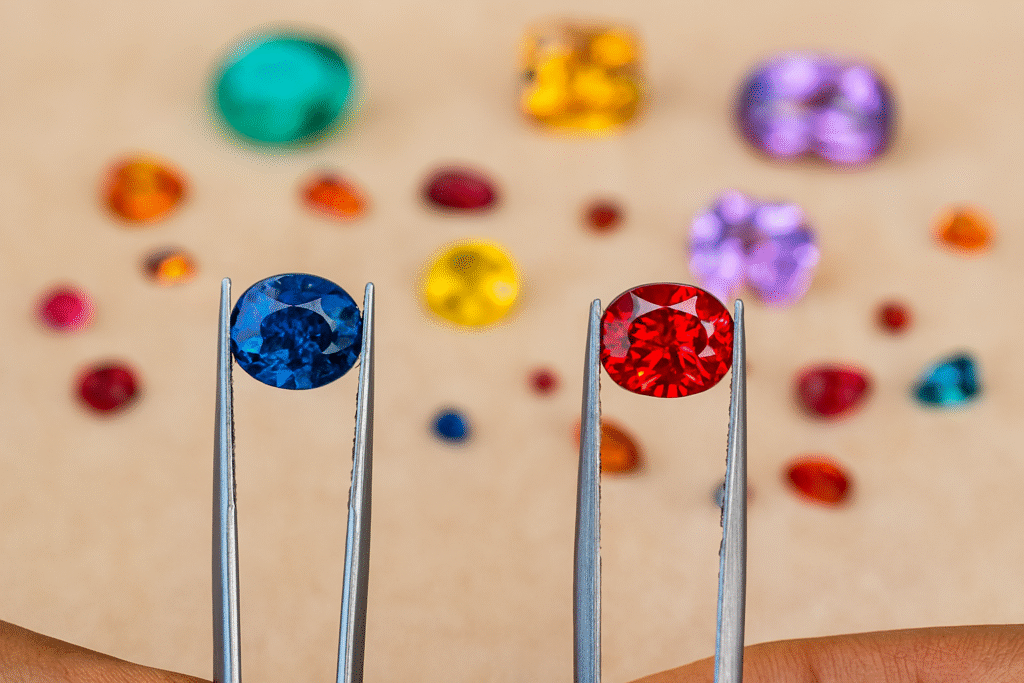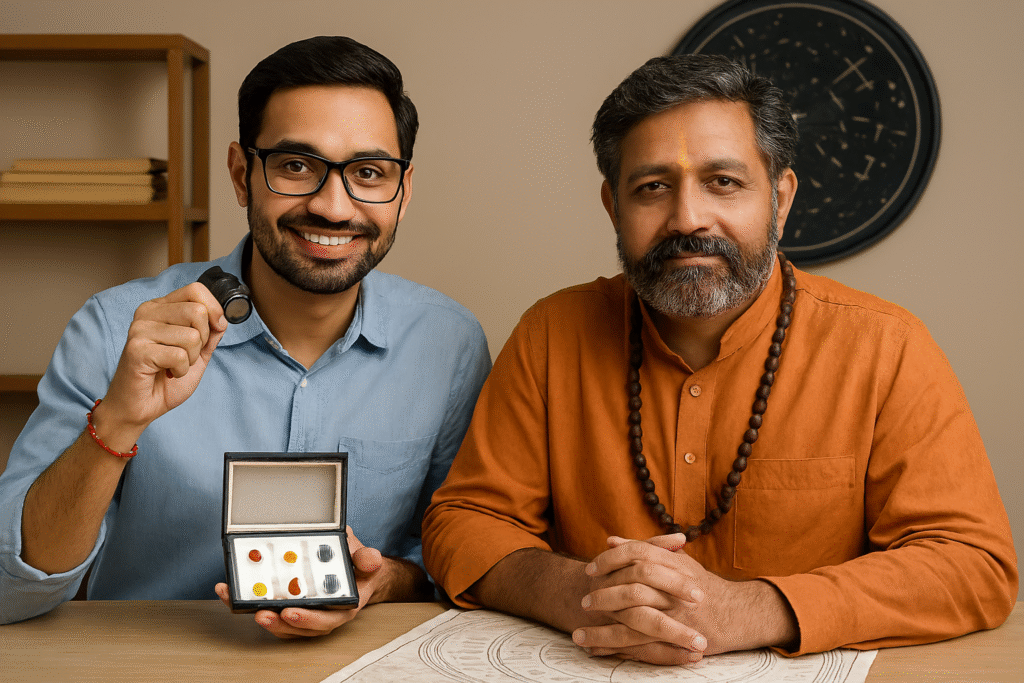Introduction
Wishful thinking in gem identification is one of the most dangerous traps in gemology. When you want a stone to be valuable, confirmation bias can blind you to evidence that proves otherwise. This guide explains how to avoid the costly mistakes that come from desire overriding discipline.
Is Wishful Thinking the Most Dangerous Trap in Gem Identification?
What You’ll Learn
- What wishful thinking means in gem identification
- How confirmation bias in gemology leads to mistakes
- Real-world examples of gem identification errors
- Practical steps to avoid bias when buying or testing gems
The Psychology Behind the Trap
Wishful thinking in gem identification happens when someone wants a stone to be valuable and ignores contradictory facts. In psychology, this is called confirmation bias. A green stone may be accepted as emerald, even if inclusions suggest it is glass.
Costly Real-World Examples
- A ruby worth $250,000 at auction turned out to be synthetic. The buyer admitted his wishful thinking stopped him from requesting lab verification.
- In Bangkok, a dealer spent $40,000 on “emeralds” that testing later proved were dyed quartz.
These cases show why gem buyers must resist bias.
How to Avoid Wishful Thinking in Gem Identification
- Use multiple tests (refractometer, spectroscopy, fluorescence).
- Always request a gemological lab certificate before major purchases.
- Ask yourself: “Am I ignoring evidence because of wishful thinking?”
. To understand similar risks in precious metals, see 24K, 22K, 18K: What Every Malayali Gold Buyer Must Know.
Expert Insight
After four decades in gemology, I’ve learned that discipline protects you more than equipment. The key is: evidence must always outweigh emotion.
For related reading, check Understanding BIS Hallmark: What It Means for Your Jewellery and How to Sell Gold in Kerala Without Losing Value.
Learn More:
- Psychology reference on confirmation bias.
- GIA (Gemological Institute of America) about gem identification reports.
Introduction
This Responsible Travel FAQ provides comprehensive answers to help you make ethical tourism choices.
Our guide covers eco-friendly accommodations, local community support, sustainable transportation, cultural respect, wildlife ethics, and ways to reduce waste.
Following these practices ensures your adventures benefit both destinations and travelers.
What is Responsible Travel and Why Does It Matter?
Responsible travel means making conscious choices that minimize negative impact while maximizing benefits for local communities and the environment.
Tourism generates $1.4 trillion annually but produces 8% of global carbon emissions.
Your travel decisions affect local economies, cultural preservation, and environmental conservation.
How Do I Choose Sustainable Accommodations?
Look for eco-certifications such as:
- Green Key
- LEED building standards
- EarthCheck approval
- Rainforest Alliance verification
Check if hotels use renewable energy, water-saving systems, and source food locally.
Ask about waste reduction programs and community involvement. Calling properties directly helps verify claims.
Transportation Options for Responsible Travel
- Train travel emits 80% less carbon than flying for similar distances.
- Choose direct flights when necessary and book economy class.
- Use public transport, bicycles, or walk instead of renting cars.
- Consider verified carbon offsets for unavoidable flights.
Supporting Local Economies
- Buy from locally-owned businesses instead of chains.
- Book community-based tours with local guides.
- Eat at family-owned restaurants with local ingredients.
- Stay in homestays or boutique hotels rather than international chains.
- Purchase authentic handicrafts fairly from artisans.
Packing Tips for Responsible Travel
- Reusable water bottle with filtration
- Solid toiletries to reduce plastic
- Reef-safe mineral sunscreen
- Reusable shopping bags
- Bamboo or metal utensils
- Portable laundry soap
Pack light and choose durable, multipurpose items.
Respecting Local Cultures
- Learn cultural customs, dress codes, and etiquette.
- Learn basic local phrases.
- Dress appropriately for religious and conservative areas.
- Ask permission before photographing people.
- Participate respectfully in cultural activities.
Ethical Wildlife Encounters
- Maintain safe distances and avoid feeding animals.
- Choose conservation-focused sanctuaries, not entertainment attractions.
- Avoid elephant rides, direct contact, or photo opportunities with captive animals.
- Use certified naturalist guides who prioritize welfare and habitat protection.
Reducing Waste During Travel
- Use reusable containers, bags, and utensils.
- Refuse single-use plastics.
- Choose digital tickets and receipts.
- Carry a small trash bag where disposal is limited.
Questions to Ask Tour Operators
- Are staff local and fairly paid?
- How does your business give back to communities?
- What environmental practices are in place?
- Are group sizes limited to reduce pressure on sensitive areas?
- Are wildlife experiences ethical and conservation-focused?
Money and Overtourism Practices
- Use local ATMs and tip according to local customs.
- Support social enterprises and cooperatives.
- Visit during shoulder seasons, off-peak hours, or lesser-known areas.
- Stay longer in fewer destinations.
Responsible Travel on a Budget
- Cook using local market ingredients.
- Use public transportation.
- Stay in local hostels, guesthouses, or homestays.
- Explore free cultural events or walking tours.
- Exchange skills or volunteer for free accommodation.
Pre-Travel Research
- Learn about environmental challenges and cultural sensitivities.
- Check seasonal weather and political situations.
- Identify local organizations to support.
- Read destination-specific responsible travel guides.
Creating a Positive Impact Post-Travel
- Share authentic stories on social media.
- Write detailed reviews for responsible businesses.
- Continue supporting local organizations.
- Apply sustainable practices in daily life.
- Recommend responsible travel to others.
Learn more:
- 【Professional Design】This refractometer is specially designed to measure the refractive index of gemstones and solid mat…
- 【High Quality】Quality all metal construction, low battery consumption can be used for a long time.Approved by strict qua…
- 【Package Contents】Built-in LED flashlight, 30x jewelers loupe in silver housing, one of the most important gemstone iden…




